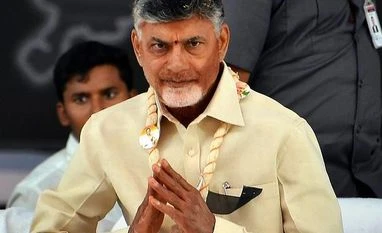N T Rama Rao was the original poster boy of populism, who made history by ousting an entrenched Congress from power on the back of the promise of cheap rice.
The issue of Telugu pride, coupled with the promise of the subsidised staple, turned out to be a deadly electoral cocktail, and a lesson the grand old party learnt the hard way in Andhra Pradesh.
Now, over 35 years after the TDP founder's feat, his son-in-law and Andhra Chief Minister, N Chandrababu Naidu, is using NTR’s name to the hilt by launching Anna canteens in the poll-bound state. The late leader was Anna (elder brother) to his people.
With the political clock ticking, Naidu has to go the extra mile in his public outreach -- the state Assembly elections are scheduled along with the Lok Sabha polls, which are practically eight months away.
NTR was known for such popular schemes. In order to supply food grains to the poor in Andhra, the late leader had started a scheme, under which rice was priced at Rs 2 per kg. He had also started Janata cloth and subsidised power schemes during his regime, with varied success.
The food card has been tellingly used in impoverished India in several states, especially the southern ones, by leaders seeking a faster connect with the electorate. As they seek the votes of the millions of poor, they know in their heart of hearts the maxim of the Mahatma: “To a man with an empty stomach, food is God”.
Late M G Ramachandran was the first to start the mid-day meal scheme in Tamil Nadu, which was later emulated all over the country. The scheme helped spread the ‘good samaritan’ image of the Tamil film legend.
His political successor, the late J Jayalalithaa of the AIADMK, expanded the sway by going in for Amma canteens a few years back. In fact, the Amma canteen has been one of the most successful welfare-cum-public outreach programmes by any government. What is noteworthy is that in cities like Chennai, it isn't just the poor who patronise the canteens, but also young software professionals and students.
In eastern India, it is no coincidence that BJD supremo Naveen Patnaik has been ruling Odisha for nearly two decades, mainly due to his pet scheme of providing cheap rice. The scheme, along with his image of an incorruptible leader who has always been pro-active in taking up the cause of the weaker sections, has yielded rich dividends to the BJD, while national parties BJP and Congress have remained ‘also ran’ for long.
BJP-ruled Chhattisgarh has seen Chief Minister Raman Singh earning the unique sobriquet of “chawalwale baba” (the rice man) for providing cheap rice in the tribal-dominated state.
In 1995, Shiv Sena had come out with Zunka-Bhakar stalls in several urban areas including Mumbai to feed the urban poor. ‘Zunka’ is a besan-based Maharashtrian preparation and ‘bhakar’ is jowar or bajra roti. The Sena along with the BJP had secured power in that Assembly poll in Maharashtra.
Taking a leaf out of Tamil Nadu’s book, Karnataka, which witnessed Assembly polls few months back, the then Siddharamaiah Government did start Indiramma canteens in several urban areas, including Bengaluru, to provide cheap cooked food to the urban poor. However, the Congress couldn't benefit much from the poll-eve scheme, as other issues dominated the campaign.
Experts say that the food card is bound to work in developing societies where the basic necessities of the masses have not been met but adult franchise has been introduced. ‘How can people understand democratic values on empty stomach’, goes the argument. Unlike Europe, India has not witnessed renaissance which saw transformation from medieval to modern times. Dr B R Ambedkar, who was also a renowned economist, had put the nail right on the head by suggesting that the problems faced by India were due to the fact that the social revolution did not precede the political revolution.
In the last Lok Sabha elections, the Congress-led UPA brought the National Food Security Act to provide cheap food to the masses. The issue, brought at the fag end of the UPA-II term, failed to click as the regime was rocked by scams and scandals and the then BJP-led Opposition was successful in focusing on them and promising achhe din.
It is to be seen how Naidu would be able to reap electoral rewards with the Anna NTR canteens, as his known detractor Y S Jaganmohan Reddy of the YSR Congress has been doing a padyatra for the past six months, focusing on the omissions and commissions of the TDP Government.
TDP has also plans to fulfill its election promise of an unemployment dole to youth in the state on the poll eve, which is being dubbed as an “expired biscuit” by its detractors.
With stakes high in the coming Lok Sabha polls, the ruling BJP and its detractors could be deliberating deeply on how best to use the food card nationally to help the common man on the one hand and help the distressed farmer on the other. Incidently, the food card has not been used in politically key Uttar Pradesh and Bihar so far.
Unlock 30+ premium stories daily hand-picked by our editors, across devices on browser and app.
Pick your favourite companies, get a daily email with all news updates on them.
Full access to our intuitive epaper - clip, save, share articles from any device; newspaper archives from 2006.
Preferential invites to Business Standard events.
Curated newsletters on markets, personal finance, policy & politics, start-ups, technology, and more.



)